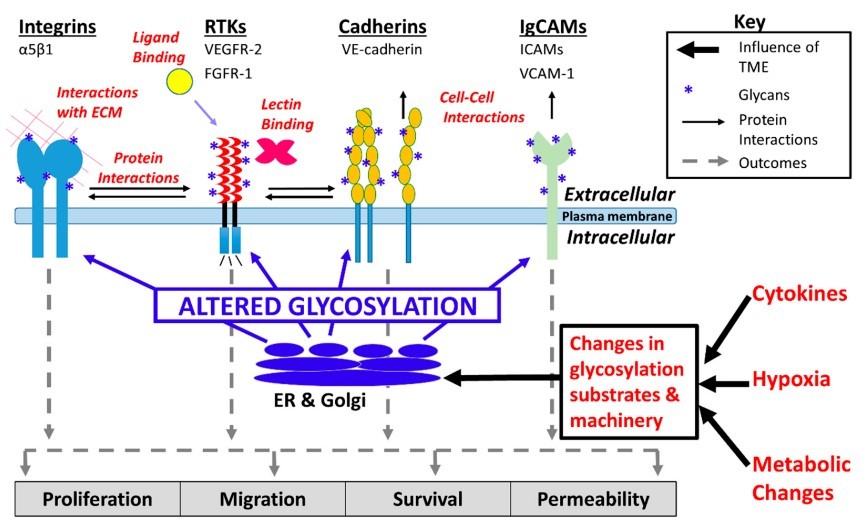Tumor Glyco-diag Services
Creative Biolabs has been a long-term expert in the field of tumor-associated glycans. Based on our advanced platforms and extensive experience, we are pleased to improve your productivity and streamline your research processes. As an extension of your laboratory, now we can provide a series of tumor glyco-diag services for our clients all over the world.
Introduction of Tumor Glycosylation
Tumor growth is accompanied by the tumor evading the immune system. Abnormal tumor glycosylation changes the way the immune system perceives tumors, and can also induce immunosuppressive signal transduction through glycan-binding receptors. In this case, the specific glycan characteristics of tumor cells can be regarded as a new type of immune checkpoint. At the same time, the glycosylation of tumor proteins will produce new antigens, which can be used as tumor-specific T cell targets.
 Fig.1 Changes in endothelial cell glycosylation mediated by the tumor microenvironment.1, 2
Fig.1 Changes in endothelial cell glycosylation mediated by the tumor microenvironment.1, 2
Glycosylation is the process of adding oligosaccharide polymers, N and O linked glycoproteins, glycolipids, and proteoglycans to protein or lipid carriers. Glycomics refers to the extensive study of glycans or complex carbohydrates. Glycosylation plays an important role in the normal physiological functions of humans. Therefore, abnormal glycosylation is closely related to the occurrence and development of multiple cancers. In recent years, the emerging areas for glycomics research include the altered mechanisms of regulation of the UDP-N-acetyl-D galactosamine, miRNA regulation of glycosyltransferase activity, glycosylation in cancer exosomes/microvesicles, as well as glycan metabolism in the tumor environment.
During tumorigenesis, abnormal glycosylation can lead to the expression of specific tumor-associated glycans. In general, tumor-associated carbohydrates (TAC) are mostly located on the surface of cancer cells, so they are used as potential diagnostic biomarkers. In summary, the detection of potential glycan biomarkers is of great significance for the early diagnosis and targeted therapy of cancers.
The change in the structure of oligosaccharides represents a key feature in the development of tumor characteristics in proliferating cells. This differential change is mainly regulated by the expression pattern of glycosyltransferase (GT) genes. The expression level of GT is controlled by dysregulation of transcription level, dysfunction of molecular chaperones, and changes in glycosidase activity. A variety of cancers can be classified through the expression analysis of GT genes, so GT gene expression profiles can be used for the development of cancer classifiers and propose subtypes.
According to naturally occurring anti-glycan antibodies and glycan-antibody interactions based on high-throughput technology, tumor-associated carbohydrates (TAC) can be detected and used as a basis for early cancer diagnosis. The normal technologies for glyco-code based diagnostics include ELISA, lectin–Fc chimeras, lectin blot analysis, RNA sequencing, and RNA microarray.
Creative Biolabs has been a long-term expert in the field of glycomics research. Along with our tumor glyco-diag services, we can work with you to create a timeline and plan for your operation. If you are interested in our products or services, please do not hesitate to contact us for more detailed information.
References
-
Chandler, Kevin Brown, Catherine E. Costello, and Nader Rahimi. "Glycosylation in the tumor microenvironment: implications for tumor angiogenesis and metastasis." Cells 8.6 (2019).
-
Under Open Access license CC BY 4.0, without modification.
For Research Use Only.
Related Services

 Fig.1 Changes in endothelial cell glycosylation mediated by the tumor microenvironment.1, 2
Fig.1 Changes in endothelial cell glycosylation mediated by the tumor microenvironment.1, 2

